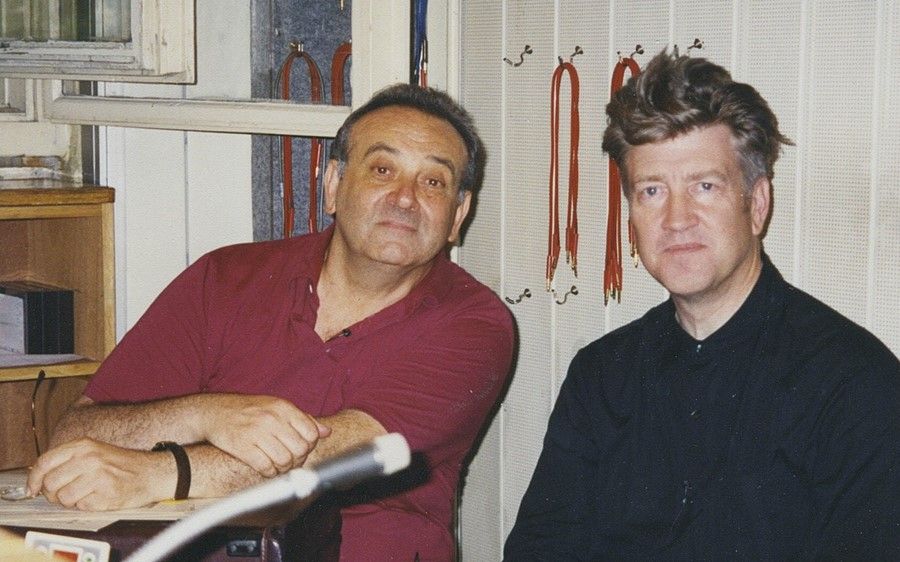Film composer Angelo Badalamenti (pictured left), a noted collaborator of surrealist filmmaker David Lynch (pictured right), passed away on December 11. He was 85.
Per their decades-long creative partnership, the jazz and ambient-motivated Badalamenti provided the Golden Globe-nominated scores for Lynch’s The Straight Story (1999) and Mulholland Drive (2001), as well the Grammy-winning Twin Peaks (1990-1991; 2017) theme.
Badalamenti had a knack for cutting Lynch nightmares with dreamy, even Heavenly relief after the characters had tangled enough with the darkness for their liking. As Lynch Blue Velvet (1986) and Twin Peaks frontman Kyle MacLachlan put it on Twitter in response to “the brilliant and talented maestro’s” passing, Badalamenti “was a master at setting a mood.”
No form of art, at least in the United States, is ingested quite as much as film scores, except, perhaps, for the films themselves. Scoring also extends to television, radio, commercials and even video games.
Therefore, it stands to reason that any entertainment-engaged person will understand how important music is to our forms of media.
Well-written scores and themes are often universally recognizable. For instance, some people have never seen a Star Wars film, but can easily recall the main theme, brilliantly scored by John Williams. Likewise, most can whistle the Super Mario Bros. theme despite having never touched a video game console in their lives.
Without getting granular, a quality film score can usually consist of two basic strategies: 1) identifying the contrasting ideas or emotions and writing convincing music to depict both, then joining them together cohesively; and 2) writing based on memories and to appeal to the listeners’ memories.
Music in and of itself doesn’t elicit an emotional response. Rather, it does so by invoking memories that cause us to experience said reactions. Writing music to appeal to memories and emotions, which are often widely relatable among audiences, is step one in exemplary scoring. A strategy to attain this is for the composer to score their own memories in an attempt to relate to the audience preemptively.
Angelo Badalamenti understood these two facets of film scoring. A perfect example is his score to his and Lynch’s 1999 film, The Straight Story. He displays intimate knowledge of the orchestra, while, uncharacteristically of himself, combines the fiddle and the acoustic guitar, to convey the contrasting ideas of a rural, open setting with the feeling of leaving your childhood home.
“Nothing tops ‘Laurens Walking’ from The Straight Story for me,” Messenger Editor and “Reels with Reis” columnist Michael J. Reistetter spoke of Badalementi’s score for Lynch’s surprising, but quite beautiful Disney turn.
He added, “It’s my favorite piece of film music ever because it defies your expectation heading in, and you still know who is behind it without getting distracted. It reminds me of my grandpa. The tail of a dying man traveling states away via tractor to bid farewell to his equally dying brother before the clock runs out— it needed someone like Badalamenti. He’s often been tasked with arranging cathartic crescendos in exchange for the Hell Lynch just put you and his characters through— the Fire Walk with Me (1992) outro comes to mind. But in The Straight Story, Badalamenti gets to tug at your heartstrings with his the entire time. You know what’s coming, yet you can’t turn it off because you recognize the sound of mortality and inevitability doesn’t hurt as bad when it’s Angelo who’s responsible for making it.”
While not as revered as legends like John Williams and Hans Zimmer, when Angelo Badalamenti got it right, he really got it right. In my book, and clearly in Reis’, that’s enough to label him as one of the best. May Badalamenti rest in peace and continue to craft bone-chilling numbers for Twin Peaks’ late house singer Julee Cruise beyond the sycamore trees.







